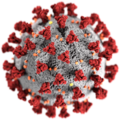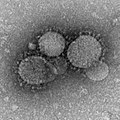User:Trymianc/sandbox
| This is not a Wikipedia article: It is an individual user's work-in-progress page, and may be incomplete and/or unreliable. For guidance on developing this draft, see Wikipedia:So you made a userspace draft. Find sources: Google (books · news · scholar · free images · WP refs) · FENS · JSTOR · TWL |
This page has been removed from search engines' indexes.
Copied content from Coronavirus disease; see that page's history for attribution


A coronavirus disease (COVID),[1][2] coronavirus respiratory syndrome, coronavirus pneumonia, coronavirus flu, or any other variant, is a disease caused by members of the coronavirus (CoV) family.
Coronaviruses cause different coronavirus diseases including Severe acute respiratory syndrome (SARS), Middle East respiratory syndrome (MERS),[3] Coronavirus disease 2019 (COVID-19)[4] and can also cause the common cold.[5][6][7]
The 2019–20 coronavirus outbreak (COVID-19) was declared a pandemic by the World Health Organisation (WHO) on 11 March 2020.[8] Local transmission of the disease has been recorded in many countries across all six WHO regions.[9] COVID-19 is caused by the coronavirus SARS-CoV-2.[4]
Coronavirus diseases
[edit]| MERS-CoV | SARS-CoV | SARS-CoV-2 | |
|---|---|---|---|
| Disease | MERS | SARS | COVID-19 |
| Outbreaks | 2012 | 2002–2004 | 2019−present |
| Epidemiology | |||
| Date of first identified case |
June 2012 |
November 2002 |
December 2019[10] |
| Location of first identified case |
Jeddah, Saudi Arabia |
Shunde, China |
Wuhan, China |
| Age average | 56 | 44[11][a] | 56[12] |
| Sex ratio (M:F) | 3.3:1 | 0.8:1[13] | 1.6:1[12] |
| Confirmed cases | 2494 | 8096[14] | 676,609,955[15][b] |
| Deaths | 858 | 774[14] | 6,881,955[15][b] |
| Case fatality rate | 37% | 9.2% | 1.02%[15] |
| Symptoms | |||
| Fever | 98% | 99–100% | 87.9%[16] |
| Dry cough | 47% | 29–75% | 67.7%[16] |
| Dyspnea | 72% | 40–42% | 18.6%[16] |
| Diarrhea | 26% | 20–25% | 3.7%[16] |
| Sore throat | 21% | 13–25% | 13.9%[16] |
| Ventilatory use | 24.5%[17] | 14–20% | 4.1%[18] |
| Notes | |||
SARS
[edit]In 2003 severe acute respiratory syndrome coronavirus (SARS-CoV), causing severe acute respiratory syndrome (SARS), lead to the 2002–2004 SARS outbreak. Over 8,000 people from 29 different countries and territories were infected, and at least 774 died worldwide.[19]
MERS
[edit]In 2012 Middle East respiratory syndrome-related coronavirus (MERS-CoV), causing Middle East respiratory syndrome, was identified.[20]
MERS-CoV is responsible for the 2012 MERS outbreak, primarily in the Middle East, the 2015 MERS outbreak in South Korea and the 2018 MERS outbreak primarily in Saudi Arabia.
COVID-19
[edit]The severe acute respiratory syndrome coronavirus 2 (SARS-CoV-2), causing coronavirus disease 2019 (COVID-19), which in December 2019 lead to a pneumonia outbreak in Wuhan, China resulted in the 2019–20 coronavirus pandemic.
Coronaviruses
[edit]Coronaviruses are viruses which cause diseases in mammals and birds. In humans the viruses cause respiratory tract infections which can range from mild to lethal.[5]
Six species of human coronaviruses are known, of which four are among the viruses which cause the common cold or common respiratory illnesses: HCoV-229E, HCoV-NL63, HCoV-OC43, and HCoV-HKU1.[5][6][7][21] Two additional species cause more severe symptoms and may be lethal: MERS-CoV and two different strains of SARS: SARS-CoV and SARS-CoV-2.[19][22]
Gallery
[edit]-
Illustration of a SARS-CoV-2 virus which causes coronavirus disease 2019.
-
Electron micrograph of SARS-CoV-2 with its visible coronae.
-
Electron microscope image shows SARS-CoV-2 emerging from the surface of cells (blue/pink) cultured in the lab.
-
MERS-CoV particles as seen by negative stain electron microscopy.
-
Formation of Human coronavirus HKU1, a coronavirus causing symptoms of the common cold in humans.[6][7]
See also
[edit]References
[edit]- ^ BBC News (11 February 2020). "Coronavirus officially named Covid-19, says WHO". BBC.
- ^ World Health Organization (11 February 2020). "COVID-19: New coronavirus given name by World Health Organization". CanWest Global. Global News.
- ^ "Middle East respiratory syndrome coronavirus (MERS-CoV)". World Health Organization. June 2015. Retrieved 6 April 2020.
- ^ a b c Lim, Yvonne Xinyi; Ng, Yan Ling; Tam, James P.; Liu, Ding Xiang (25 July 2016). "Human Coronaviruses: A Review of Virus–Host Interactions". Diseases. 4 (3): 26. doi:10.3390/diseases4030026. ISSN 2079-9721. PMC 5456285. PMID 28933406.
See Table 1.
{{cite journal}}: CS1 maint: unflagged free DOI (link) - ^ a b c Fehr AR, Perlman S (2015). Maier HJ, Bickerton E, Britton P (eds.). "Coronaviruses: an overview of their replication and pathogenesis". Methods in Molecular Biology. 1282. Springer: 1–23. doi:10.1007/978-1-4939-2438-7_1. ISBN 978-1-4939-2438-7. PMC 4369385. PMID 25720466.
See section: Virion Structure.
- ^ "WHO Director-General's opening remarks at the media briefing on COVID-19". World Health Organization (WHO) (Press release). 11 March 2020. Archived from the original on 11 March 2020. Retrieved 6 April 2020.
- ^ "WHO Situation Report #65" (PDF). WHO. 25 March 2020.
{{cite web}}: CS1 maint: url-status (link) - ^ Wang C, Horby PW, Hayden FG, Gao GF (February 2020). "A novel coronavirus outbreak of global health concern". Lancet. 395 (10223): 470–473. doi:10.1016/S0140-6736(20)30185-9. PMC 7135038. PMID 31986257.
- ^ Lau EH, Hsiung CA, Cowling BJ, Chen CH, Ho LM, Tsang T, Chang CW, Donnelly CA, Leung GM (March 2010). "A comparative epidemiologic analysis of SARS in Hong Kong, Beijing and Taiwan". BMC Infectious Diseases. 10: 50. doi:10.1186/1471-2334-10-50. PMC 2846944. PMID 20205928.
- ^ a b "Old age, sepsis tied to poor COVID-19 outcomes, death". CIDRAP, University of Minnesota. 10 March 2020. Retrieved 29 March 2020.
- ^ Karlberg J, Chong DS, Lai WY (February 2004). "Do men have a higher case fatality rate of severe acute respiratory syndrome than women do?". American Journal of Epidemiology. 159 (3): 229–31. doi:10.1093/aje/kwh056. PMC 7110237. PMID 14742282.
- ^ a b "Summary of probable SARS cases with onset of illness from 1 November 2002 to 31 July 2003". World Health Organization. April 2004.
- ^ a b c "COVID-19 Dashboard by the Center for Systems Science and Engineering (CSSE) at Johns Hopkins University (JHU)". ArcGIS. Johns Hopkins University. Retrieved 10 March 2023.
- ^ a b c d e "Report of the WHO-China Joint Mission on Coronavirus Disease 2019 (COVID-19)" (PDF). World Health Organization. February 2020.
- ^ Oh MD, Park WB, Park SW, Choe PG, Bang JH, Song KH, Kim ES, Kim HB, Kim NJ (March 2018). "Middle East respiratory syndrome: what we learned from the 2015 outbreak in the Republic of Korea". The Korean Journal of Internal Medicine. 33 (2): 233–246. doi:10.3904/kjim.2018.031. PMC 5840604. PMID 29506344.
- ^ Ñamendys-Silva SA (March 2020). "Respiratory support for patients with COVID-19 infection". The Lancet. Respiratory Medicine. 8 (4): e18. doi:10.1016/S2213-2600(20)30110-7. PMC 7129706. PMID 32145829.
- ^ a b "How SARS terrified the world in 2003, infecting more than 8,000 people and killing 774". businessinsider.com. 21 February 2020. Retrieved 6 April 2020.
- ^ Doucleef M (26 September 2012). "Scientists Go Deep On Genes Of SARS-Like Virus". Associated Press. Archived from the original on 27 September 2012. Retrieved 6 April 2020.
- ^ Corman VM, Muth D, Niemeyer D, Drosten C (2018). "Hosts and Sources of Endemic Human Coronaviruses". Advances in Virus Research. 100: 163–88. doi:10.1016/bs.aivir.2018.01.001. ISBN 978-0-12-815201-0. PMID 29551135.
- ^ "Middle East respiratory syndrome coronavirus (MERS-CoV)". WHO. Archived from the original on 18 October 2019. Retrieved 10 December 2019.
External links
[edit] The dictionary definition of COVID at Wiktionary
The dictionary definition of COVID at Wiktionary
[[Category:Coronaviridae|Respiratory syndrome [[Category:Syndromes affecting the respiratory system [[Category:Pneumonia [[Category:Zoonoses







![Formation of Human coronavirus HKU1, a coronavirus causing symptoms of the common cold in humans.[6][7]](http://upload.wikimedia.org/wikipedia/commons/thumb/8/8a/Coronavirus-HKU1.png/120px-Coronavirus-HKU1.png)